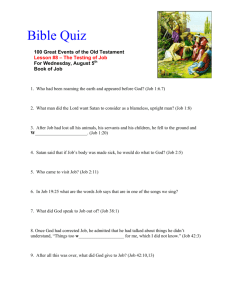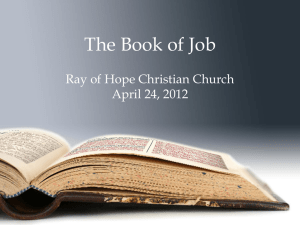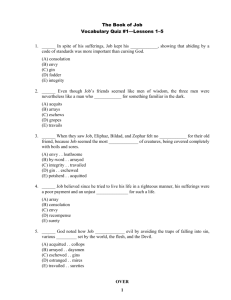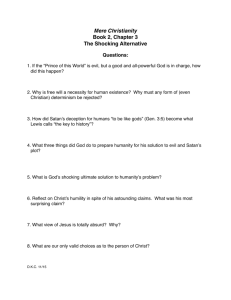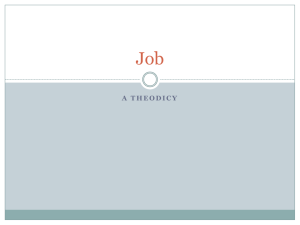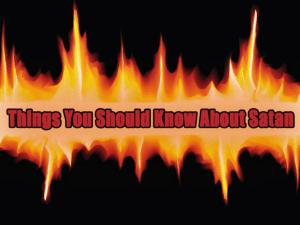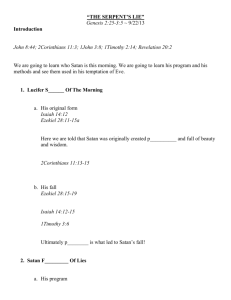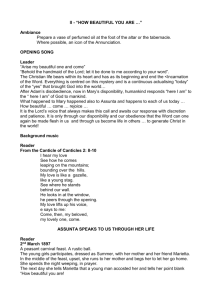OTPP19.1-Job.Pt1-DeRouchie
advertisement
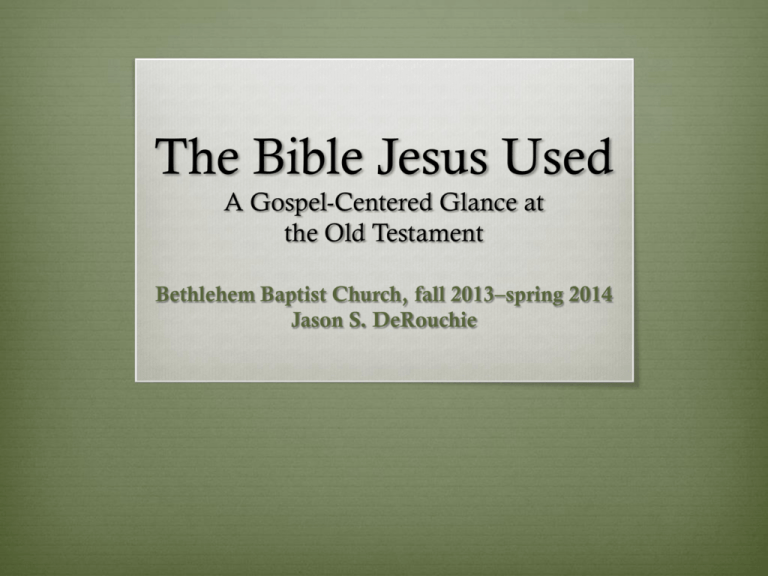
The Bible Jesus Used A Gospel-Centered Glance at the Old Testament Bethlehem Baptist Church, fall 2013–spring 2014 Jason S. DeRouchie Job at a Glance Act 1 Act 2 Act 3 Act 4 Act 5 Prologue Dialogue with Three Friends 1–2 3–31 Interchange with Three Friends (3–26) Job’s Extended Response with Meditation on the Nature and Source of Wisdom (27–28) Job’s Final Defense (29–31) Elihu’s Speeches Yahweh’s Speeches Epilogue 32–37 38:1–42:6 42:7–17 Overview of the Drama Act 1: Prologue (chs. 1–2)––A Cosmic Challenge Overview: Setting (1:1–5) Scene 1 (1:6–22) A Heavenly confrontation (1:6–13) Test 1: Job’s earthly suffering (1:14–22) Scene 2 (2:1–13) A Heavenly confrontation (2:1–6) Test 2: Job’s earthly suffering (2:7–10) Transition: Three friends mourn with Job (2:11– 13) Setting (1:1–5) Job’s piety (v. 1) Job’s progeny (v. 2) Job’s possessions (v. 3) Job’s pattern: a patriarchal-priestly role (vv. 4– 5) Scene 1 (1:6–22): A Heavenly Confrontation (1:6–13) Setting: The Satan (“adversary/accuser”) before Sovereign Yahweh (v. 6) Q&A 1: The sphere of the Satan’s accusatory power (v. 7) Yahweh’s query (v. 7a) The Satan’s answer (v. 7b) Q&A 2: The object of the Satan’s next attack (vv. 8–12) Yahweh’s query (v. 8) The Satan’s response (vv. 9–11) Yahweh guidelines (v. 12) Test 1: Job’s earthly suffering––deep loss (1:14–22) The nature of Job’s loss described (1:14–19) The setting (v. 13) Messenger 1: Foreigners from the south steal oxen and donkeys and slay servants (vv. 14–15) Messenger 2: Fire from heaven consumes sheep and servants (v. 16) Messenger 3: Foreigners from the north steal camels and slay servants (v. 17) Messenger 4: Wind destroys house, killing all his sons and daughters Job 9:13, 17–18. God will not turn back his anger; beneath him bowed the helpers of Rahab. . . . 17 He crushes me with a tempest and multiplies my wounds without cause; 18 he will not let me get my breath, but fills me with bitterness. Job’s response detailed (1:20–22) Job’s posture: grief and trust (v. 20) Job’s pronouncement: Job 1:21. Naked I came from my mother’s womb, and naked shall I return. The LORD gave, and the LORD has taken away; blessed be the name of the LORD. Job’s purity: Job 1:22. In all this Job did not sin or charge God with wrong. 2 Sam 24:1. Again the anger of the LORD was kindled against Israel, and he incited David against them, saying, “Go, number Israel and Judah.” 1 Chr 21:1. Then Satan stood against Israel and incited David to number Israel. 2 Cor 12:7–9. So to keep me from becoming conceited because of the surpassing greatness of the revelations, a thorn was given me in the flesh, a messenger of Satan to harass me, to keep me from becoming conceited. 8 Three times I pleaded with the Lord about this, that is should leave me. 9 But he said to me, “My grace is sufficient for you, for my power is made perfect in weakness.” Therefore I will boast all the more gladly of my weaknesses, so that the power of Christ may rest upon me. The Lesson from Test 1 Satan’s query: “Does Job fear God for no reason? . . . Stretch out your hand and touch all that he has, and he will curse you to your face” (Job 1:9, 11). The truth: Yahweh’s worth is greater than all possessions or family. Scene 2 (2:1–13): A Heavenly Confrontation (2:1–6) Setting: The Satan (“adversary/accuser”) before Sovereign Yahweh (v. 1) Q&A 1: Restating the sphere of the Satan’s accusatory power (v. 2) Q&A 2: The object of the Satan’s renewed attack (vv. 3–6) Yahweh’s query and reassertion of Job’s integrity and, ultimately, his own worth (v. 3) The Satan’s response (vv. 4–5) Yahweh guidelines (v. 6) Test 2 Introduced: Job’s earthly suffering–– deep physical, emotional, and theological pain (1:7–10) The source and nature of Job’s physical pain described (v. 7) The response detailed (vv. 8–10) Job’s posture: mourning and attempt to ease the physical pain (v. 8). Job’s wife’s plea: to curse God and die (thus failing the test) (v. 9) Job’s pronouncement (v. 10): Job 2:10. You speak as one of the foolish women would speak. Shall we receive good from God, and shall we not receive evil? Test 2 Introduced: Job’s earthly suffering–– deep physical, emotional, and theological pain (1:7–10) The source and nature of Job’s physical pain described (v. 7) The response detailed (vv. 8–10) Job’s posture: mourning and attempt to ease the physical pain (v. 8). Job’s wife’s plea: to curse God and die (thus failing the test) (v. 9) Job’s pronouncement (v. 10) Job’s purity (v. 10) Job 1:10. In all this Job did not sin with his lips. Job 28:20–28. From where, then, does wisdom come? And where is the place of understanding? 21 It is hidden from the eyes of all living and concealed from the birds of the air. 22 Abaddon and Death say, “We have heard a rumor of it with our ears.’”23 God understands the way to it, and he knows its place. 24 For he looks to the ends of the earth and sees everything under the heavens. 25 When he gave to the wind its weight and apportioned the waters by measure, 26 when he made a decree for the rain and a way for the lightning of the thunder, 27 then he saw it and declared it; he established it, and searched it out. 28 And he said to man, “Behold, the fear of the Lord, that is wisdom, and to turn away from evil is understanding.” Rom 11:33–36. Oh, the depth of the riches and wisdom and knowledge of God! How unsearchable are his judgments and how inscrutable his ways! 34 For who has known the mind of the Lord, or who has been his counselor? 35 Or who has given a gift to him that he might be repaid? 36 For from him and through him and to him are all things. To him be glory forever. Amen. Why would good grant that suffering would hit his children? It must be for his own glory and for our good. We know “God opposes the proud but gives grace to the humble” (1 Pet 5:5). When believers cry for help, God is magnified and we are satisfied.
